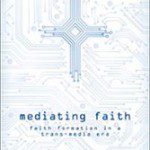“Heaven became intensely personal to my wife, Sarah, and me in August 2009 when a one-person car accident sent our son, Josiah, to heaven. I’m a pastor, so heaven wasn’t a new concept or something I hadn’t thought about previously. But, as anyone would expect, this one moment in time forever changed us.” — Pastor Steve Berger, author, Between Heaven and Earth
This month at the Patheos Book Club, we’re featuring a new book by Steve Berger called Between Heaven and Earth: Finding Hope, Courage, and Passion Through a Fresh Vision of Heaven. Berger is the senior pastor to more than 4,000 people at Grace Chapel in Leipers Fork, Tennessee, and a part of the faculty for the National Worship Leader Conference.
Here, Berger responds to a few questions about his renewed vision of the afterlife.
There are other books that look at heaven. What makes Between Heaven and Earth unique?
Some books are written from a personal heavenly experience and some either talk about heaven’s glory or they focus on how Christians can be productive while on earth when they have a heavenly perspective. Between Heaven and Earth combines a vivid picture of heaven’s glory that should motivate us to lead fruitful lives on earth. Our example is the apostle Paul (see Philippians 1:21–24), whose heart was passionately fixed on heaven while his hand was purposefully working to produce fruit. Paul’s dilemma is the focus of the teaching of Between Heaven and Earth.
 Why has your life and teaching been so focused on heaven these past four years?
Why has your life and teaching been so focused on heaven these past four years?
Heaven became intensely personal to my wife, Sarah, and me in August 2009 when a one-person car accident sent our son, Josiah, to heaven. I’m a pastor, so heaven wasn’t a new concept or something I hadn’t thought about previously. But, as anyone would expect, this one moment in time forever changed us. It has served to increase our passion for heaven and has changed our attitudes about how life should be lived while we’re on earth. Josiah—a strong, vibrant young man—was just about to begin his freshman year at the University of Tennessee. Like many young men and women his age, Josiah lived at full throttle. His entire life was ahead of him. Our son, unbeknownst to us, signed up as an organ donor. This one sacrificial act deeply affected us. Why? Because it was a clear example to us that not only was Josiah serious about Jesus but he also loved people enough to (literally) give himself away. His hands were open to people’s needs because his heart was in the right place.
One day you were grieving over all the experiences your son missed in life. Tell us what happened.
As a dad, I was looking forward to sharing certain milestones in Josiah’s life: college, marriage, and children. I dreamed of standing proudly by as he received his diploma from the University of Tennessee. I wanted to officiate my son’s wedding to his bride. And I definitely longed to hold Josiah’s children—children that would have been our grandchildren. I remember puzzling over these thoughts, agonizing over them. And early one morning, still turning these issues over and around in my mind, I finally poured out my complaint before the Lord just as David did (Psalm 142:2). I did all this in the shower. The shower is a fabulous place to get real. In the shower, I could sob and heave and cry out, unconcerned about being heard. In the shower, my tears and the water could run together. In the shower, I could come undone. And, believe me, I did.
“What about college? What about marriage? What about children? What about all the things he will never, ever experience this side of heaven? What about those things, Lord?” I sobbed out questions that were some of the most emotionally charged I have ever asked aloud in my whole life. And there, in my bathroom shower, hidden away from everyone else but God, I finally heard the Lord speak. “I have more than made up for these things.” I was stunned to silence. All I heard was the sound of water. After a minute, I spoke again. “You mean more than marrying the love of his life, Lord? More than having kids?” “Yes,” came the kind answer. “I have more than made up for these things, Steve.”
You say that it’s not just those who are grieving who need a heavenly perspective, but all believers. Why is it so helpful for the believer to live in the reality of heaven each day?
To briefly illustrate the point, the apostle Paul writes, “If then you were raised with Christ, seek those things which are above, where Christ is, sitting at the right hand of God. Set your mind on things above, not on things on the earth” (Colossians 3:1–2). It’s time for every believer to become heavenly minded and understand exactly what that means. It’s time to talk biblically about heaven because we’re missing opportunities to receive and share hope and healing and to extend our hands to help others in need. It is not just those who are grieving that need a heavenly perspective—it’s every believer. Unfortunately, many Christians have moved away from the foundational hope that Jesus came to give us—the reality of eternal life with Him in heaven.
How did Paul the apostle’s perspective of heaven affect him and his ministry?
When we read Acts 9:1–8, we see that Paul’s plans changed radically. He saw a heavenly light, he heard a heavenly voice, and he was immediately sent on a heavenly mission. This was the beginning of Paul’s new hard-pressed lifestyle, having his heart in heaven and his hand in the harvest. Why was his heart so quickly focused on heaven? The answer is in one word: Jesus. Paul so easily and eagerly committed his heart to having a heavenly focus because of the mercy, forgiveness, redemption, and kindness that Jesus, the Son of God, showed to a murderer. Paul’s heart instantly went to heaven because of this incredible loving-kindness of Jesus Christ from heaven. This is also why, after hearing from the Lord, he said, “Lord, what do you want me to do?” Heaven changed Paul’s heart; therefore, his hand was ready to work in the harvest. Paul’s desire for heaven allowed him to endure the struggles he faced in the midst of trying to reach people for heaven.
You say, “Being saved isn’t just having the hope of heaven; that’s only the beginning point.” Can you unpack this for us?
It’s how we live after we’re saved—how productive and fruitful we are in loving and serving others—that matters and determines our reward from Jesus. How we live every day, whether we realize it or not, sows seeds for eternity. We’re either sowing worthwhile seeds that produce fruit, or we’re sowing worthless seeds that have no eternal value.
What does the Bible say about our work in heaven?
There’s work in heaven. Revelation 7:15 tells us, “Therefore they are before the throne of God, and serve Him day and night in His temple. And He who sits on the throne will dwell among them.” From Revelation 7 and Revelation 22, without question, we will keep on serving Him. We tend to shy away from this idea because we don’t exactly know what this “work” is going to look like. Frankly, I can’t help thinking that there are jobs to organize, there are plans to execute; there’s building and farming and teaching and exploring and creating and artistry. Who knows how we’re going to serve Him, but we’re told twice by the apostle John in Revelation that we are going to be serving or continuing to serve God.
There is one difference between our current work and work in heaven. In that happy place, our work will be without the opposition and problems that come from serving God here on earth. Our work in heaven will only and always be completely satisfying and fulfilling. I can’t wait to work for Jesus—forever. I can’t wait to offer back to Him whatever He gives me, with love, and say, “Lord, anything that you’ve given me—here it is back to you. I want to serve you and love you and worship you for all of eternity.” Cleary, we’ll be working in heaven and not simply strumming a harp on a cloud.
Tell us what it means to reign with Christ in heaven. Will we all be reigning with Christ?
Revelation 5:10 says, “And have made us kings and priests to our God; and we shall reign on the earth.” We are not kings and priests in some sort of passive, uninvolved sense. We are kings and priests who have the privilege and opportunity of reigning with Jesus. We’ll be able to execute His will in certain situations—we’ll have responsibility and authority given to us so that we can oversee what God wants done. Revelation 2:26 says, “And he who overcomes, and keeps My works until the end, to him I will give power over the nations.” Our reward for overcoming in this life is sharing Christ’s reign in heaven. A natural question is, “Where does our authority to reign come from?” I believe our authority in heaven is a result of how faithful we’ve served God here on earth. It’s a function of how well we’ve done what He’s asked us to do. It’s service now, authority and responsibility later. If we’re not ready to get our hands dirty now and do His work, why should He give us great authority and responsibility in heaven? If we’re not ready to put our hand in the harvest here, why should we expect a promotion when we get to heaven?
How does having a heavenly perspective of life equip us to be an active part of the harvest, sharing the gospel?
Our hands are in the harvest because of heaven’s sending. Jesus said to Paul, “Go. I want you to go” (Acts 9:6). Paul immediately obeyed and started sharing Jesus in the synagogue (Acts 9:20). Throughout his ministry, Paul went where God led him to preach the good news of Jesus because of heaven’s call (sending) upon his life. Without question, we are to imitate the lifestyle of having our hearts in heaven and our hands in the harvest. It’s not just for preachers. It’s not just for apostles or prophets. It is for every believer. Paul said, “Imitate me as I imitate Christ” (1 Corinthians 11:1). It’s a mindset we need to cultivate and live as long as we’re here on this earth. It’s our mission to serve Jesus and serve others. John Stott wrote, “The Living God of the Bible is a sending God. . . .[He is] a missionary God!” Knowing what awaits us in heaven, knowing that God desires that everyone should go there, and knowing that He’s called us to proclaim those truths, equips and inspires us to be, like Paul, proclaimers of the gospel of Jesus Christ.
Read an excerpt and more from Between Heaven and Earth at the Patheos Book Club here.













